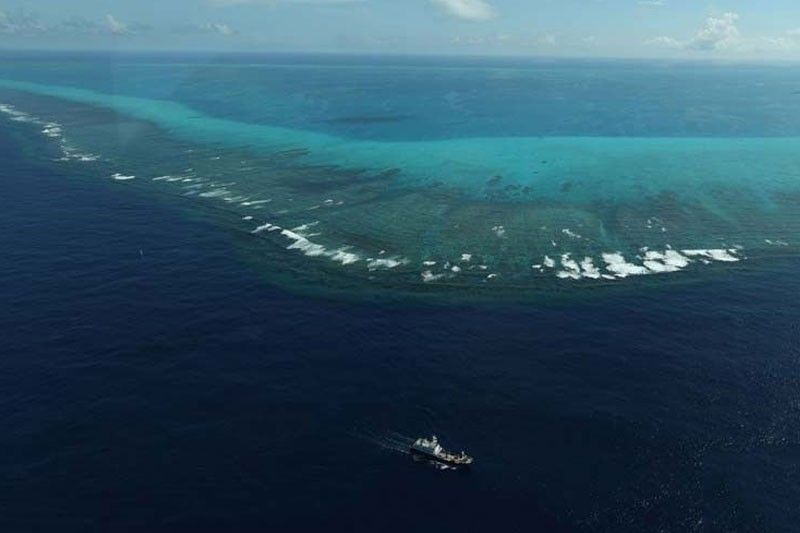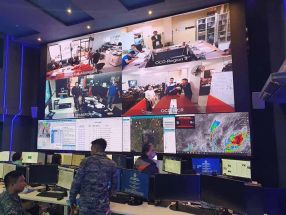Philippines not stirring trouble in West Philippine Sea – Teodoro

MANILA, Philippines — China is “reversing the truth” in accusing the Philippines of stirring trouble by conducting joint maritime patrols with the United States military in the West Philippine Sea, Defense Secretary Gilbert Teodoro said yesterday.
“The Philippines is not stirring up trouble. This is a reverse of the truth, it’s an absolute falsity for China to say that, and it is once again reversing the truth consistent with its narrative,” Teodoro told reporters.
“Who’s occupying, who’s making incursions in the South China Sea, in the West Philippine Sea especially? It’s China,” Teodoro said.
“The Philippines is not stirring up trouble as we always reiterate. Our interests are to protect our rights in accordance with UNCLOS and international law which China purports to respect in words but unfortunately not in deeds, and so whatever China says about this, I think their credibility is very, very low,” he added, referring to the United Nations Convention on the Law of the Sea.
Teodoro issued the statement a day after the Armed Forces of the Philippines (AFP) and the US Indo-Pacific Command completed a three-day joint sea and air patrol in Philippine waters.
He said there would be more joint patrols with the US and possibly even with other countries supporting the call for a rules-based international order and a peaceful resolution of sea disputes.
The joint activity, held from Nov. 21 to 23, was also a show of the country’s firm resolve to defend its sovereignty and territorial rights, the AFP said.
“There will be several iterations of joint patrols and this should not be an issue because it is entirely within the rights of the Philippines to patrol anywhere, whether in the high seas or in the area where it has jurisdiction pursuant to international law,” Teodoro explained.
“In the seas we have right of innocent passage and the freedom of navigation. Within our area, we have the sole police jurisdiction over the area and it is a question for the Philippines and not any other country to determine,” he said.
Teodoro said other nations interested in joining joint naval patrols are Japan, South Korea and even Canada, among others, and it is up to the AFP to make plans for such and how to carry them out.
AFP chief Gen. Romeo Brawner Jr. said the three-day inaugural joint sea and air patrol between the Philippines and the US was a success because “we feel that we have met the objectives that we have set forth before the conduct of the joint maritime and air patrols and so we are confident that we are now more able to operate with our ally, the United States.”
“Kasi ang isang tinesting natin doon yung (Because what we’re testing there is) interoperability of our navy as well as our air force and as we saw from the pictures and from the video, also from the reports that were given to us, we were able to achieve that interoperability with our ally. So we’re very happy with the results of the joint maritime and air patrol,” he added.
Brawner said the activity also shows that the Philippines is “telling the world that it is possible, it’s possible to operate within our exclusive economic zone without necessarily harassing other countries. We can easily operate, so this is one message that we are telling the world.”
He likewise confirmed that the Chinese People’s Liberation Army Navy indeed shadowed or followed Philippine and US ships during the joint maritime patrol.
“We expected this and we are also thankful that there was no untoward incidents that happened during this, the whole joint patrol, the whole three days,” Brawner said, noting that China has always been shadowing not only Philippine ships but also other ships in the area.
National Security Adviser Eduardo Año also denounced China for claiming the Philippines is now using foreign forces for its maritime patrols.
“The Philippines categorically rejects China’s assertion that the Philippines has enlisted ‘foreign forces’ to patrol the South China Sea. The joint patrols conducted by the Philippines with the United States are well within our rights as a sovereign nation and in accordance with international law, the RP-US Mutual Defense Treaty and the Visiting Forces Agreement,” he said in a statement yesterday.
“The Philippines has the inherent and sovereign right to conduct joint air and naval patrols with its partners, allies and friends to ensure the security and stability of the region. The maritime cooperation activity is a series of goodwill activities at sea,” he stressed.
He explained the joint patrols were conducted within 40 to 140 nautical miles from mainland Luzon and Palawan and are well within the country’s exclusive economic zone. “China’s claim that our actions are allegedly ‘stirring up trouble’ in the region is unfounded,” he noted.
“We will continue to exercise our rights and fulfill our obligations to maintain peace and stability in the region in support of a free and open Indo-Pacific. We reject any attempt to undermine our legitimate actions to safeguard our sovereignty, sovereign rights and jurisdiction,” Año maintained.
“We call on all parties to respect international law, engage in constructive dialogue and work towards a peaceful and cooperative future in the entire South China Sea,” he said. — Sheila Crisostomo
- Latest
- Trending































